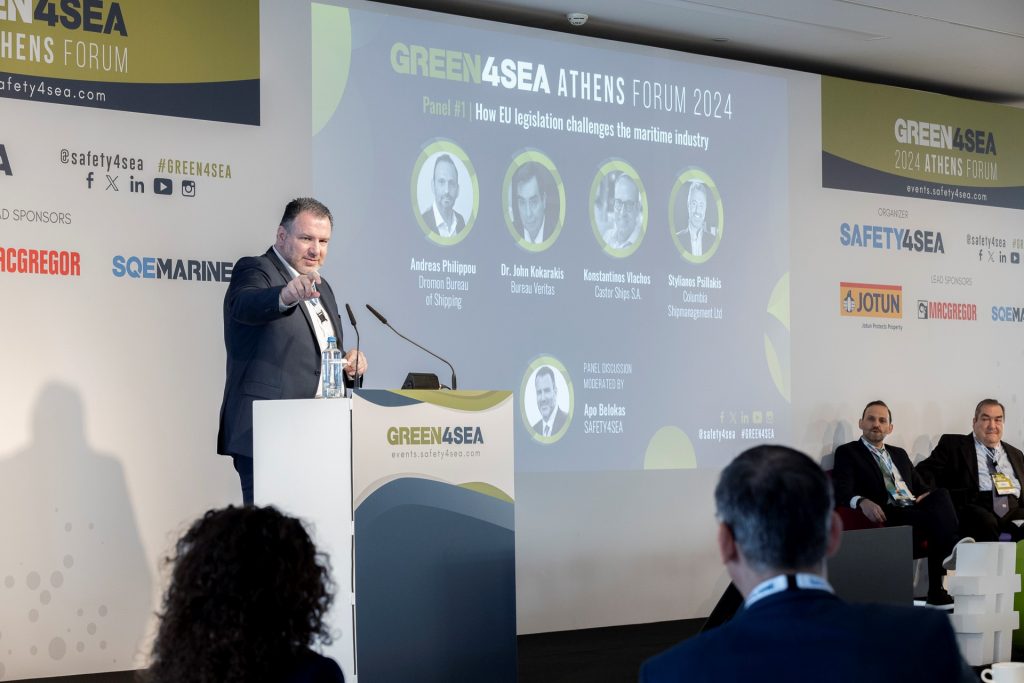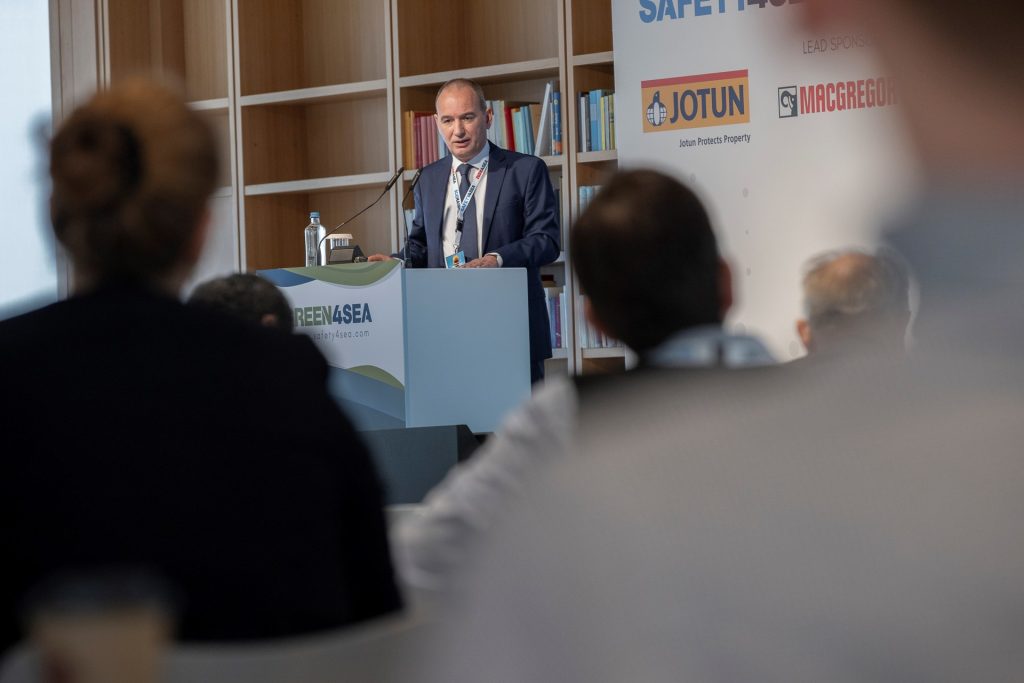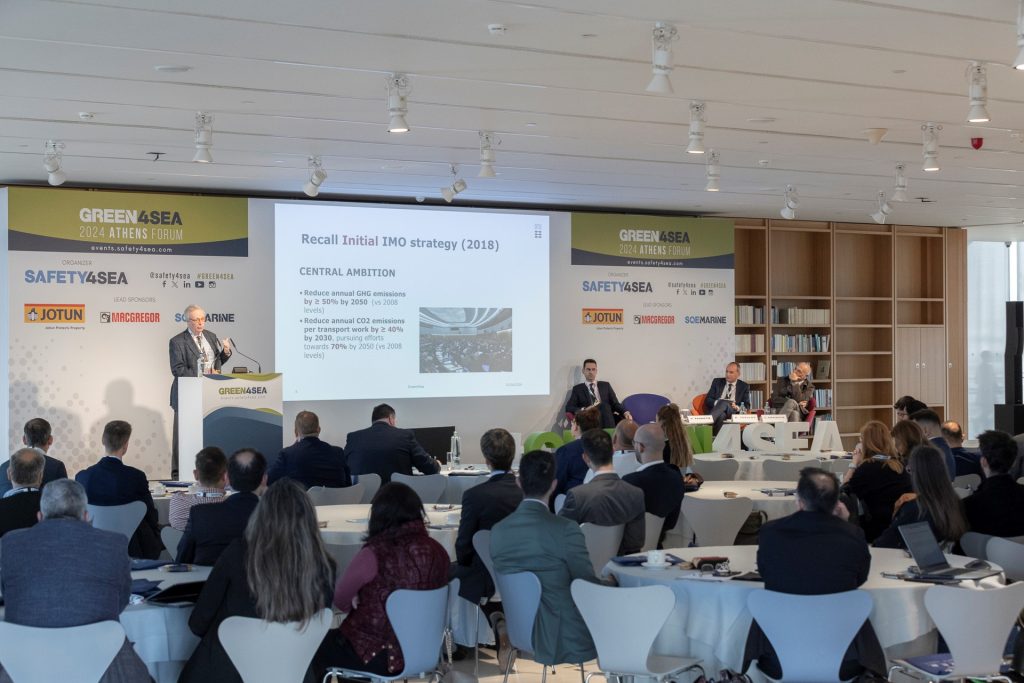The 2024 GREEN4SEA Athens Forum successfully took place on Tuesday 2nd of April 2024 at the Lighthouse of Stavros Niarchos Foundation Cultural Center (SNFCC), Athens. The event focused on the various alternatives that the maritime industry explores in its ongoing efforts to reduce emissions, planning for a green and sustainable future.
The event was organized by SAFETY4SEA having as lead sponsors the following organizations: Jotun, MacGregor, and SQE MARINE. The event was also sponsored by: ARCADIA SHIPMANAGEMENT CO. LTD, Blue Planet Shipping Ltd, BUREAU VERITAS, Capital-Executive Ship Management Corp., Capital Gas Ship Management Corp., Capital Shipmanagement, DÖHLE SEAFRONT Crewing, Dromon Bureau of Shipping, Eastern Mediterranean Maritime Limited (EASTMED), Ecoslops, ERMA FIRST, GIT Coatings, Latsco Marine Management Inc., Lloyd’s Register (LR), Marine & Industrial Systems (MIS), NAPA, RISK4SEA, SEAFiT, UK P&I Club, V. Group, and Wärtsilä.
Supporters of the event included the following organizations: Clean Shipping Alliance 2020, GSR Services, Hellenic Institute of Marine Technology (H.I.M.T.), International Bunker Industry Association (IBIA), International Ship Recycling Association (ISRA), International Windship Association (IWSA), INTERCARGO, Marine Technical Managers Association (MARTECMA), Worldwide Industrial and Marine Association (W.I.M.A.), Zero Emissions Ship Technology Association (ZESTAs), and Π.Ε.Π.Ε.Ν. Furthermore, Worldoils acted as the event’s media sponsor.
Agenda highlights
- The EU ETS scheme: Understanding the regulatory framework
- EU MRV: Application & timeline and its relation to the EU ETS
- Key requirements of FuelEU and other emissions regulations
- Why accurate and transparent reporting matters
- Addressing safety challenges
- Bunkering & latest revision of ISO 8217 standard
- Focus on modern propulsion schemes
- Flexibility and capability towards IMO 2030/2050
- How to ensure a profitable circular economy within ports
- Ship recycling challenges and regulatory update
- How to modernize waste management in shipping
- How to ensure a profitable circular economy within ports
- Ship recycling challenges and regulatory update
- How to modernize waste management in shipping
Opening the forum, Apo Belokas, the Managing Editor of SAFETY4SEA, welcomed the attendees and speakers and expressed gratitude to all the event sponsors and supporters. During his enlightening presentation, Apo Belokas emphasized the current maritime industry’s tendency to undervalue and underestimate the importance of human factors. He explained that even though industry stakeholders try to implement environmental, social, and governance (ESG) strategies, they tend to put most of the effort on the environmental aspect. He also pointed out the obstacles slowing down the push for decarbonization, highlighting high expenses and possible delays as major challenges. Additionally, he mentioned that there’s expected to be a rise in operating costs, including those related to human factors.
Session #1: How EU legislation challenges the maritime industry
Andreas Philippou, CEO, Dromon Bureau of Shipping, delivered a presentation focused on the EU ETS (European Union Emissions Trading System) and its impact on the EU MRV (Monitoring, Reporting, and Verification) framework. He began by discussing the EU ETS policy context, providing an overview, and explaining its scope of application. Shifting his focus to the EU MRV, he detailed its application and timeline, highlighting the new requirements for MRV monitoring plans and emissions reports.
Dr. John Kokarakis, the Technical Director at SEEBA Zone, Bureau Veritas, delivered a comprehensive presentation on the FuelEU Maritime legislation, which is mainly technical and focuses on fuels. He began by thoroughly exploring the primary objectives of the regulation, providing a detailed analysis of its framework, and offering insights into its advantages and disadvantages. Furthermore, Kokarakis elaborated on the different compliance options that are available under this regulation. He went on to highlight potential loopholes within the legislation that could pose significant challenges for stakeholders in the maritime industry.
Konstantinos Vlachos, Chief Technical Operations Officer, Castor Ships S.A., offered his valuable insights during discussions, noting that he considers Fuel EU as the measure that will incentivize a lot of developments and change in the industry. Meanwhile, Stylianos Psillakis, Technical Director, Columbia Shipmanagement Ltd., expressed the idea that it will be quite challenging for existing vessels to comply with the new legislation and for people to adapt to change and learn to comply with all the novel requirements.
 Session #2: Decarbonization in Shipping
Session #2: Decarbonization in Shipping
Nikos Kakalis, Global Bulk Carriers Segment Director, Lloyd’s Register, centered his presentation on the subject of improving energy efficiency and making the right fuel choice. The presenter gave a specific focus on bulk carrier vessels, as they comprise most of the commercial fleet. Furthermore, Nikos Kakalis pointed out the increasing need for innovation and new technologies to be developed for maritime operations and the important need to focus on the human factor.
Dr. Harilaos Psaraftis, Professor Emeritus, Technical University of Denmark, focused on recent advancements in shipping decarbonization and future prospects. He contrasted the approaches of the International Maritime Organization (IMO) and the European Union (EU), highlighting the significant uncertainties facing the journey to net-zero emissions. These uncertainties encompass the results of the impact assessment for the package of measures, the specific contents of this package, including a carbon levy, and the intersection of policies between the IMO and regional regulations.
Dimitris Tsoulos, BLUE CONNECT Sales Director, ERMA FIRST, explored the benefits of a holistic approach to the decarbonization challenge in the maritime industry. Dimitris Tsoulos explored comprehensive strategies and solutions aimed at reducing carbon emissions in shipping operations. His presentation also covered a wide range of topics, including a variety of innovative technologies, shore power, regulatory compliance, and best practices to achieve sustainable and safe maritime operations.
Capt. Konstantinos G. Karavasilis, Regional Director, Loss Prevention, UK P&I Club, addressed the uncertain environment in which owners and managers currently operate, particularly in relation to the International Maritime Organization’s (IMO) ambitions for decarbonization. The presentation also delved into important subjects, including human factor considerations, transition challenges, readiness regarding alternative fuel infrastructure and handling, carbon capture technologies, and the contractual changes and associated risks during this transitional period.
 Session #3: Navigating alternative marine fuels
Session #3: Navigating alternative marine fuels
Bill Stamatopoulos, Global Business Development Director at VeriFuel, delivered a comprehensive presentation on the anticipated ISO 8217:2024 standard. Scheduled for publication in May of that year, his talk provided attendees with an in-depth overview of the forthcoming updates to the standard. Bill Stamatopoulos focused on key areas, including changes in chemical composition, the shift towards alternative fuel sources, and advancements in testing methodologies, offering essential insights into the evolving landscape of marine fuels.
Panos Zachariadis, Technical Director, Atlantic Bulk Carriers Management Ltd., focused on challenging the common perceptions and misconceptions surrounding the role of green hydrogen in decarbonizing the shipping industry. The presenter explained that unburned hydrogen escaping into the atmosphere is a dangerous greenhouse gas, while only 1% of hydrogen is green and electrolysis-based. He also highlighted the significant total cost of 9.5 trillion dollars to replace the current infrastructure to support alternative fuels.
Alexander Prokopakis, Executive Director, IBIA, gave a presentation on the importance of bunkering for the maritime industry. He explained the role and goals of IBIA as an organization, standards, vision, and future aims. He also advocated for small steps towards an energy transition. He explained that the two following decades will bring about a number of changes, raising the need for the maritime industry to stay alert and informed in order to keep up.
Session #4: Best Practices for Ship Performance
Tom Evensen, Regional Category Manager Hull Performance, Jotun, delivered a presentation emphasizing the significant impact of maintaining a clean hull on maritime operations and environmental sustainability, saying that. He highlighted that a clean hull not only reduces speed loss and saves fuel but also minimizes a vessel’s operational downtime. Furthermore, Tom Evensen stressed the importance of clean hulls in ensuring regulatory compliance and protecting biodiversity by reducing the risk of transmigration of foreign aquatic species. He pointed out that protecting the current merchant fleet from biofouling could potentially cut CO2 emissions by up to 19%.
Philippos Sfiris, Head of Go-to-Market Strategy and Vessel Performance, GIT Coatings, emphasized the significance of maintaining a smooth and fouling-free hull, especially as the shipping industry strives to achieve the ambitious IMO targets for emissions reduction. Philippos Sfiris pointed out the advantages of proactive cleaning or grooming as a preventive strategy for biofouling management, contrasting it with the damaging effects of reactive cleaning, which can harm the paint and release harmful substances into the water.
Philippos Giannakos, Senior Sales Manager, Shipping Solutions, South Europe, Middle East, and Africa, NAPA, pointed out the need for flexible technological platforms to help ship owners comply with evolving regulations and maintain a competitive advantage. During his presentation, Philippos Giannakos also emphasized the benefits of improved voyage planning and up-to-date performance information for efficient ship maintenance. Additionally, the presenter supported the idea that the human element will be the driver for smarter ships.
Mats Nyfors, General Manager, Decarbonization & Cooperation, Wärtsilä, presented the audience with the reasons why a strategic roadmap aimed at achieving net-zero greenhouse gas emissions by 2050 through the adoption of energy-efficient engines, innovative propulsion systems, hybrid technology, and integrated powertrain solutions is a valid option on the way to decarbonization. Furthermore, he urged industry leaders to take proactive steps in shaping the future of sustainable fuels, emphasizing that leveraging today’s technology can future-proof newbuild projects for tomorrow.
 Session #5: Circular Economy for Sustainable Shipping
Session #5: Circular Economy for Sustainable Shipping
Vincent Favier, CEO, ECOSLOPS S.A., addressed the challenges associated with waste discharge at sea, emphasizing that compliance often incurs costs for waste collection. Vincent Favier acknowledged that while treating waste can sometimes be more expensive than purchasing new items, it has the potential to be profitable for all parties involved. His presentation advocated rethinking traditional waste management practices to unlock circular economy opportunities while addressing environmental concerns.
Dr. Konstantinos Galanis, Chairman of the International Ship Recycling Association, provided insights into the current and future landscape of ship recycling. He addressed the environmental challenges of existing ship recycling methods and highlighted opportunities for more sustainable and eco-friendly approaches. Additionally, the presentation delved into regulatory developments, technological innovations, and best practices aimed at enhancing the sustainability of ship recycling processes.
Georgios Plevrakis, Group CEO, HEC Group, made interesting points during his presentation, stressing that there needs to be a value chain comprising different stages in order to manage waste. According to the speaker, a zero waste, circular economy bears great benefits, significantly improving operations.
John N. Cotzias, Projects & Finance, Xclusiv Shipbrokers, delivered a focus presentation titled “Decarbonization Footpath: We Need to Be Realistic,” advocating for reducing emissions in a practical and realistic way. He mentioned how the broking profession and sales have been impacted by environmental ratings on vessels, especially the Carbon Intensity Index (CII), which, in the presenter’s opinion, needs to be revised. The speaker explained that compliance becomes increasingly challenging for medium sized companies that cannot always bear the cost. He also explained that rather than trying to reinvent many wheels, maybe he should try to optimize the one we already have.
Session #6: The Green Transition from Ship Managers’ Perspective
During the last panel discussion, Takis Koutris, Managing Director, Roxana Shipping S.A.; George Souravlas, Founder & CEO, Load Line Marine S.A.; Basil Sakellis, CEO, Alassia NewShips Management Inc.; Dimitris Patrikios, Advisor to the Managing Director, V.Ships Greece Ltd.; and John N. Cotzias, Projects & Finance, Xclusiv Shipbrokers, offered their valuable opinions on decarbonization policies and how the ever-changing landscape impacts ship management and finance.
The speakers discussed current challenges regarding emission reduction regulations, which are not always reflecting the readiness of the industry. They agreed that achieving net zero is a long road, marked by uncertainty, which considerably increases the need for vigilance and makes it unlikely for the industry to switch fuels anywhere in the near future.
































































